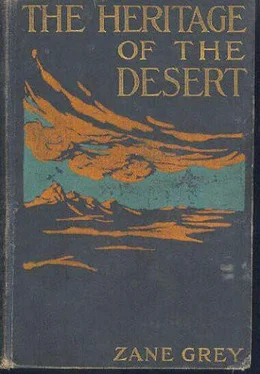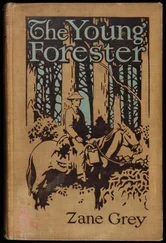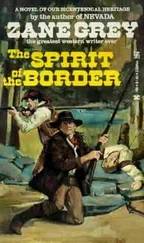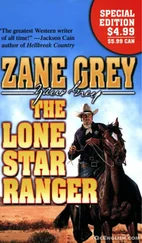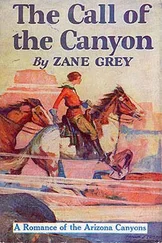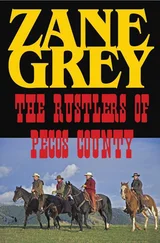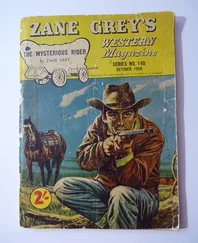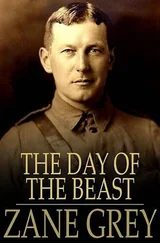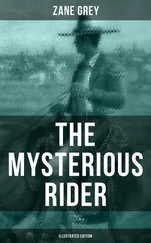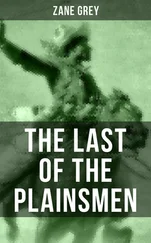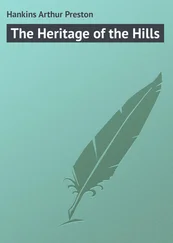Her silence answered him.
"But, Mescal, if you really love me you can't marry any one else," said Hare. It was the simple persistence of a simple swain.
"Oh, you don't know, you don't know. It's impossible!"
"Impossible!" Hare's anger flared up. "You let me believe I had won you. What kind of a girl are you? You were not true. Your actions were lies."
"Not lies," she faltered, and turned her face from him.
With no gentle hand he grasped her arm and forced her to look at him. But the misery in her eyes overcame him, and he roughly threw his arms around her and held her close.
"It can't be a lie. You do care for me–love me. Look at me." He drew her head back from his breast. Her face was pale and drawn; her eyes closed tight, with tears forcing a way out under the long lashes; her lips were parted. He bowed to their sweet nearness; he kissed them again and again, while the shade of the cedars seemed to whirl about him. "I love you, Mescal. You are mine–I will have you–I will keep you–I will not let him have you!"
She vibrated to that like a keen strung wire under a strong touch. All in a flash the trembling, shame-stricken girl was transformed. She leaned back in his arms, supple, pliant with quivering life, and for the first time gave him wide-open level eyes, in which there were now no tears, no shyness, no fear, but a dark smouldering fire.
"You do love me, Mescal?"
"I–I couldn't help it."
There was a pause, tense with feeling.
"Mescal, tell me–about your being pledged," he said, at last.
"I gave him my promise because there was nothing else to do. I was pledged to–to him in the church at White Sage. It can't be changed. I've got to marry–Father Naab's eldest son."
"Eldest son?" echoed Jack, suddenly mindful of the implication. "Why! that's Snap Naab. Ah! I begin to see light. That–Mescal–"
"I hate him."
"You hate him and you're pledged to marry him! ... God! Mescal, I'd utterly forgotten Snap Naab already has a wife."
"You've also forgotten that we're Mormons."
"Are you a Mormon?" he queried bluntly.
"I've been raised as one."
"That's not an answer. Are you one? Do you believe any man under God's
sky ought to have more than one wife at a time?"
"No. But I've been taught that it gave woman greater glory in heaven. There have been men here before you, men who talked to me, and I doubted before I ever saw you. And afterward–I knew."
"Would not Father Naab release you?"
"Release me? Why, he would have taken me as a wife for himself but for Mother Mary. She hates me. So he pledged me to Snap."
"Does August Naab love you?"
"Love me? No. Not in the way you mean–perhaps as a daughter. But Mormons teach duty to church first, and say such love comes–to the wives–afterward. But it doesn't–not in the women I've seen. There's Mother Ruth–her heart is broken. She loves me, and I can tell."
"When was this–this marriage to be?"
"I don't know. Father Naab promised me to his son when he came home from the Navajo range. It would be soon if they found out that you and I– Jack, Snap Naab would kill you!"
The sudden thought startled the girl. Her eyes betrayed her terror.
"I mightn't be so easy to kill," said Hare, darkly. The words came unbidden, his first answer to the wild influences about him. "Mescal, I'm sorry–maybe I've brought you unhappiness.
"No. No. To be with you has been like sitting there on the rim watching the desert, the greatest happiness I have ever known. I used to love to be with the children, but Mother Mary forbade. When I am down there, which is seldom, I'm not allowed to play with the children any more.'
"What can I do?" asked Hare, passionately.
"Don't speak to Father Naab. Don't let him guess. Don't leave me here alone," she answered low. It was not the Navajo speaking in her now. Love had sounded depths hitherto unplumbed; a quick, soft impulsiveness made the contrast sharp and vivid.
"How can I help but leave you if he wants me on the cattle ranges?"
"I don't know. You must think. He has been so pleased with what you've done. He's had Mormons up here, and two men not of his Church, and they did nothing. You've been ill, besides you're different. He will keep me with the sheep as long as he can, for two reasons–because I drive them best, he says, and because Snap Naab's wife must be persuaded to welcome me in her home."
"I'll stay, if I have to get a relapse and go down on my back again," declared Jack. "I hate to deceive him, but Mescal, pledged or not–I love you, and I won't give up hope."
Her hands flew to her face again and tried to hide the dark blush.
"Mescal, there's one question I wish you'd answer. Does August Naab think he'll make a Mormon of me? Is that the secret of his wonderful kindness?"
"Of course he believes he'll make a Mormon of you. That's his religion. He's felt that way over all the strangers who ever came out here. But he'd be the same to them without his hopes. I don't know the secret of his kindness, but I think he loves everybody and everything. And Jack, he's so good. I owe him all my life. He would not let the Navajos take me; he raised me, kept me, taught me. I can't break my promise to him. He's been a father to me, and I love him."
"I think I love him, too," replied Hare, simply.
With an effort he left her at last and mounted the grassy slope and climbed high up among the tottering yellow crags; and there he battled with himself. Whatever the charm of Mescal's surrender, and the insistence of his love, stern hammer-strokes of fairness, duty, honor, beat into his brain his debt to the man who had saved him. It was a long-drawn-out battle not to be won merely by saying right was right. He loved Mescal, she loved him; and something born in him with his new health, with the breath of this sage and juniper forest, with the sight of purple canyons and silent beckoning desert, made him fiercely tenacious of all that life had come to mean for him. He could not give her up–and yet–
Twilight forced Hare from his lofty retreat, and he trod his way campward, weary and jaded, but victorious over himself. He thought he had renounced his hope of Mescal; he returned with a resolve to be true to August, and to himself; bitterness he would not allow himself to feel. And yet he feared the rising in him of a new spirit akin to that of the desert itself, intractable and free.
"Well, Jack, we rode down the last of Silvermane's band," said August, at supper. "The Navajos came up and helped us out. To-morrow you'll see some fun, when we start to break Silvermane. As soon as that's done I'll go, leaving the Indians to bring the horses down when they're broken."
"Are you going to leave Silvermane with me?" asked Jack.
"Surely. Why, in three days, if I don't lose my guess, he'll be like a lamb. Those desert stallions can be made into the finest kind of saddle-horses. I've seen one or two. I want you to stay up here with the sheep. You're getting well, you'll soon be a strapping big fellow. Then when we drive the sheep down in the fall you can begin life on the cattle ranges, driving wild steers. There's where you'll grow lean and hard, like an iron bar. You'll need that horse, too, my lad."
"Why–because he's fast?" queried Jack, quickly answering to the implied suggestion.
August nodded gloomily. "I haven't the gift of revelation, but I've come to believe Martin Cole. Holderness is building an outpost for his riders close to Seeping Springs. He has no water. If he tries to pipe my wafer–" The pause was not a threat; it implied the Mormon's doubt of himself. "Then Dene is on the march this way. He's driven some of Marshall's cattle from the range next to mine. Dene got away with about a hundred head. The barefaced robber sold them in Lund to a buying company from Salt Lake."
Читать дальше
